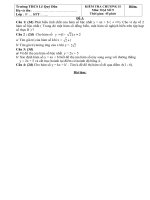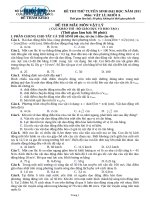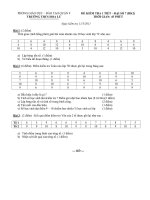đề 2 1 thập đại cao thủ số 01
Bạn đang xem bản rút gọn của tài liệu. Xem và tải ngay bản đầy đủ của tài liệu tại đây (270.88 KB, 5 trang )
<span class="text_page_counter">Trang 1</span><div class="page_container" data-page="1">
<b>BỘ GIÁO DỤC VÀ ĐÀO TẠO</b>
ĐỀ THI THAM KHẢO SỐ 02(Đề thi có 04 trang)
<b>KỲ THI TỐT NGHIỆP TRUNG HỌC PHỔ THÔNG NĂM 2024Bài thi: NGOẠI NGỮ, Môn thi: TIẾNG ANH</b>
Thời gian làm bài: 60 phút, khơng kể thời gian phát đề
<b>Họ, tên thí sinh: ...Số báo danh: ...</b>
<b>Mark the letter A, B, C, or D on your answer sheet to indicate the word whose underlined part differs from the other three in pronunciation in each of the following questions. </b>
<b>Mark the letter A, B, C, or D on your answer sheet to indicate the word that differs from the other three in the position of the primary stress in each of the following questions. </b>
<b>Question 4. A. vaccinateB. understandC. organizeD. celebrate</b>
<b>Mark the letter A, B, C, or D on your answer sheet to indicate the correct answer to each of the following questions.</b>
<b>Question 5. The girl ______ next to me at Martin’s birthday party was talkative.</b>
<b>Question 6. Many young people say that recycling is _______ way to protect the environment.</b>
<b>Question 7. John will marry her ______________________.</b>
<b>A. by the time he got the promotionB. after he had got the promotionC. as soon as he gets the promotionD. when he got the promotion</b>
<b>Question 8. This festival will be a chance for businesses throughout the country and abroad to contribute </b>
_______ the improvement of Vietnamese coffee’s position.
<b>Question 9. They will use public transport instead of their own vehicles, _______?</b>
<b>Question 10. This company has exported 24 tons of durian to Japan by ____ sea and several tons of the fruit</b>
by air.
<b>Question 11. I assure that you will surely get 12% ____ yearly if you put your saving money in my bank.</b>
<b>Question 12. He invited his girlfriend at seven o'clock, but she didn't ______ until 8.00.</b>
<b>Question 13. Ha Long Bay has become a fascinating tourist _______ in the North of Vietnam.</b>
<b>Question 14. My cousin was nervous about being interviewed on television, but he _______ to the occasion </b>
<b>Question 15. When the old man returned, the young volunteers__________ in his house.</b>
<b>Question 16. I know that you job is not going well, but don’t worry, things will be better soon. Every cloud </b>
has a ________ lining.
<b>Question 17. If any cheating is detected, the person’s exam ______.</b>
<b>Question 18. Jane would never forget ______ first prize in such a prestigious competition.</b>
</div><span class="text_page_counter">Trang 2</span><div class="page_container" data-page="2"><b>A. winningB. to winC. winD. to winning</b>
<b>Question 19. We should organise different activities to ______ people's awareness of the need to protect endangered</b>
<b>Mark the letter A, B, C, or D on your answer sheet to indicate the most suitable response to complete each of the following exchanges. </b>
<i><b>Question 20. Laura and her friend, Lilly, are in a coffee shop.</b></i>
<b>Laura: Would you like to have some orange juice?Lilly: “______. I’m not thirsty now.”</b>
<i><b>Question 21. Anna and Minh are talking about whether family members should share the housework.</b></i>
<b>Minh: " Do you guys think that teenagers should do housework?</b>
<b>Anna: " ______ teenagers as well as other members of the family should share the housework.”</b>
<b>Mark the letter A, B, C or D on your answer sheet to indicate the word(s) OPPOSITE in meaning to the underlined word(s) in each of the following questions. </b>
<b>Question 22. His parents’ reassurances did nothing to diminish his anxiety when the final examination was </b>
coming very soon.
<b>Question 23. He's a very good worker but he's sometimes a bit slow on the uptake . You have to explain </b>
everything twice.
<b>C. understand things with difficultyD. hard of hearing</b>
<b>Mark the letter A, B, C or D on your answer sheet to indicate the word(s) CLOSEST in meaning to the underlined word(s) in each of the following questions. </b>
<b>Question 24. Life on Earth is disappearing fast and will continue to do so unless urgent action is taken.</b>
<b>Question 25. T ertiary education is really for people who want formal learning in order to get an academic </b>
<i><b>Mark the letter A, B, C, or D to indicate the sentence that is closest in meaning to each of the following questions.</b></i>
<b>Question 26. It is compulsory for you to help her finish that project.</b>
<b>A. You shouldn’t help her finish that project.</b><b>B. You would help her finish that project.C. You must help her finish that project.D. You needn’t help her finish that project.</b>
<b>Question 27. The last time I went on a picnic with my family was six months ago.</b>
<b>A. I didn’t go on a picnic with my family for six months.</b><b>B. I haven’t gone on a picnic with my family for six months.C. I have gone on a picnic with my family for six months.D. I went on a picnic with my family for six months.</b>
<b>Question 28. “What did you do last night?” the policeman asked the woman.</b>
<b>A. The policeman asked the woman what had she done the night before.</b></div><span class="text_page_counter">Trang 3</span><div class="page_container" data-page="3"><b>B. The policeman asked the woman what did she do the night before.C. The policeman asked the woman what she did the night before.D. The policeman asked the woman what she had done the night before.</b>
<i><b>Mark the letter A, B, C or D to indicate the underlined part that needs correction in each of the following questions.</b></i>
<b>Question 29. Last week Peter concentrates on completing project on ASEAN and was able to submit it on </b>
A B C D
<b>Question 30. Using the new software, parents will be able to keep track of his children’s behaviour on the</b>
A B C D Internet.
<b>Question 31. People suppose that the adventure of ChatGPT will have negative impacts on how college</b>
A B C students write essays.
<b>B. If they had had breakfast, they wouldn’t be very hungry.</b>
<b>C. If they had had breakfast, they wouldn’t have been very hungry.D. If they had breakfast, they would have been very hungry.</b>
<b>Question 33. I spoke to my sister. Then, I knew what she had experienced.</b>
<b>A. Having known what my sister had experienced, I spoke to her.</b><b>B. Only after I had known what my sister had experienced did I speak to her.C. But for what my sister had experienced, I wouldn’t have spoken to her.D. Hardly had I spoken to my sister when I knew what she had experienced.</b>
<b>Read the following passage and mark the letter A, B, C, or D on your answer sheet to indicate the correct answer to each of the questions </b>
Experts estimate that over 50% of the global population currently lives in cities, and by 2050, this percentage isexpected to reach 70%. Megacities, defined as cities with over 10 million people, are becoming more common, andthe concept of mega-regions, interconnected clusters of megacities, is also gaining prominence. These megacitiesoften face challenges in accurately determining their population due to unclear boundaries and the inclusion of
<b>surrounding areas. Examples of megacities include Sao Paulo, New York, and Tokyo, which is the largest megacity</b>
in the world.
China boasts the largest mega-region, consisting of megacities like Hong Kong, Shenzhen, and Guangzhou.However, mega-regions can span multiple countries, as seen in West Africa, where Nigeria, Benin, Togo, and Ghanaform a mega-region. These mega-regions hold significant economic power, with 66% of global economic activity and85% of new technological and scientific advancements occurring within the 40 largest mega-regions. Despite this, lessthan 20% of the global population resides in these mega-regions.
In summary, urbanization continues to rise globally, with a majority of people living in cities. Megacities and
<b>mega-regions are becoming more prevalent, driving economic growth and technological advancements on a large</b>
scale.
<b>Question 34. The word “prevalent” in paragraph 3 mostly means ______.</b>
<b>Question 35. The word “which” in paragraph 1 refers to ______.</b>
<b>Question 36. Why it is hard to find the population living in megacities?</b>
</div><span class="text_page_counter">Trang 4</span><div class="page_container" data-page="4"><b>A. People are born every day.B. The suburbs grow too quickly.C. More people move to the cities.D. Defining the border of the city is hard.</b>
<b>Question 37. Which of the following is NOT true about mega-regions according to the passage?A. Most new ideas in science and technology come from them.</b>
<b>B. One-third of the world’s population lives in them.C. There is a mega-region in Africa.</b>
<b>D. Two-thirds of the world’s economic activity happens in them.Question 38. Which of the following can be the best title for the passage?</b>
<b>A. Growing Cities and RegionsB. Problems with Too Many PeopleC. Good Things about Living in CitiesD. The City with the Highest Population</b>
<b>Read the following passage and mark the letter A, B, C, or D to indicate the correct word or phrase that best fits each the numbered blanks.</b>
This article discusses the Roles of ICT, Information communication technologies, in education. ICTs are making dynamic changes in society as well as influencing (39) _______ aspects of life. Even though ICTs play significant roles in representing equalization strategy for developing countries, the reality of the digital divide, which is the gap between those people having access to, and control technology and those people (40) _______ do not make a huge difference in the use of ICTs. This means that the introduction and integration of ICTs at different levels and various types of education is the most challenging undertaking. Failure to (41) _______ the challenges would mean a further widening of the knowledge gap and deepening of existing economic and social inequalities among the developed and the developing countries. (42)
_______, the purpose of this review article is to discuss the benefits of ICT use in education, in the enhancement of student learning and experiences of some countries in order to encourage policy makers, school administrators, and teachers to pay (43) _______ so as to integrate this technology in their education systems.
<b>Question 42. A. On the contraryB. HoweverC. ThereforeD. Yet</b>
<b>Read the following passage and mark the letter A, B, C, or D on your answer sheet to indicate the correct answer to each of the questions. </b>
When General O. O. Howard assumed his duties as commissioner of the Freedmen's Bureau on May 12, 1865, hefaced no problem more difficult than that of affording freedmen legal protection. Despite the fact that the war haddealt a death blow to slavery, the legal status that blacks would occupy as free men was uncertain when the war ended. In the pre-war period, Southern state law has discriminated against free blacks, providing harsher criminalpunishment for them than for whites, denying them the right to testify against whites, and severely restricting their
<b>liberty in numerous ways. In the war's aftermath, Southern whites, rapidly able to gain control of their state and local</b>
governments under President Andrew Johnson's program of reconstruction, stood ready to apply this discriminatory
<b>law to the freedmen. Nor was the problem of affording freedmen legal protection limited to shielding them from</b>
enforcement of discriminatory state law.
In the post-war period, Southern whites, fearful of the consequences of liberation, resorted to violence on amassive scale in order to maintain their dominance over blacks. And in the face of this violence, Southern state law
<b>enforcement and judicial officials generally proved to be either unwilling or unable to bring to justice whites who had</b>
committed acts of violence against freedmen. Moreover, the problem of protecting black workers against immoralemployers also confronted Howard and his subordinates.
</div><span class="text_page_counter">Trang 5</span><div class="page_container" data-page="5">Although the Freedmen's Bureau Act authorized them to lease and ultimately to sell abandoned land to freedmen,Andrew Johnson's policy prevented Bureau officials from using that authority to make blacks
landowners. Consequently, in order to support themselves, most freedmen found it necessary to work forwhites as plantation and farm laborers. And given impoverished planters' inability to pay laborers in cash atthe end of each month, most black laborers had little choice but to agree to work for planters for an entireyear and to receive their pay, in either cash or a share of the crop, at the end of the year. In this situation,
white employers, many of whom were eager to pay their workers as little as possible, had numerous opportunities todeny freedmen’s right.
<b>Question 44. The word “unwilling” in the passage is closest in meaning to _______.</b>
<b>Question 45. The word “their” in the passage refers to _______.</b>
<b>Question 46. With which of the following statements would the author be most likely to agree?</b>
<b>A. The Freedmen's Bureau ultimately proved a success because it was able to guarantee freedmen Southern</b>
plantation and farm owners.
<b> B. Freedmen were, in many ways, still slaves after the war because of their economic dependence on plantation and</b>
<b>A. generally went unpunished.</b>
<b>B. were often law enforcement officials.C. tried to reinstate slavery into the law.D. were motivated by hate and anger.</b>
<b>Question 48. According to the passage, President Johnson's program of reconstruction _______.A. had as it primary goal the legal protection of freedmen from discrimination.</b>
<b>B. did not prevent Southerners form recovering their political power in government.C. condemned slavery but failed to take any action to destroy it.</b>
<b>D. supported the South's criminal punishment of freedmen.</b>
<b>Question 49. The world “shielding” in the passage is closest in meaning to _______.</b>
<b>Question 50. What is the passage mainly about?</b>
<b>A. The need to protect freedmen from discriminatory laws.</b>
<b>B. The violence freedmen endured and the economic plights they faced.C. General O. O. Howard's attempts to ensure economic equality for freedmen.D. The problems facing the Freedmen's Bureau.</b>
<b> THE END </b>
</div>








